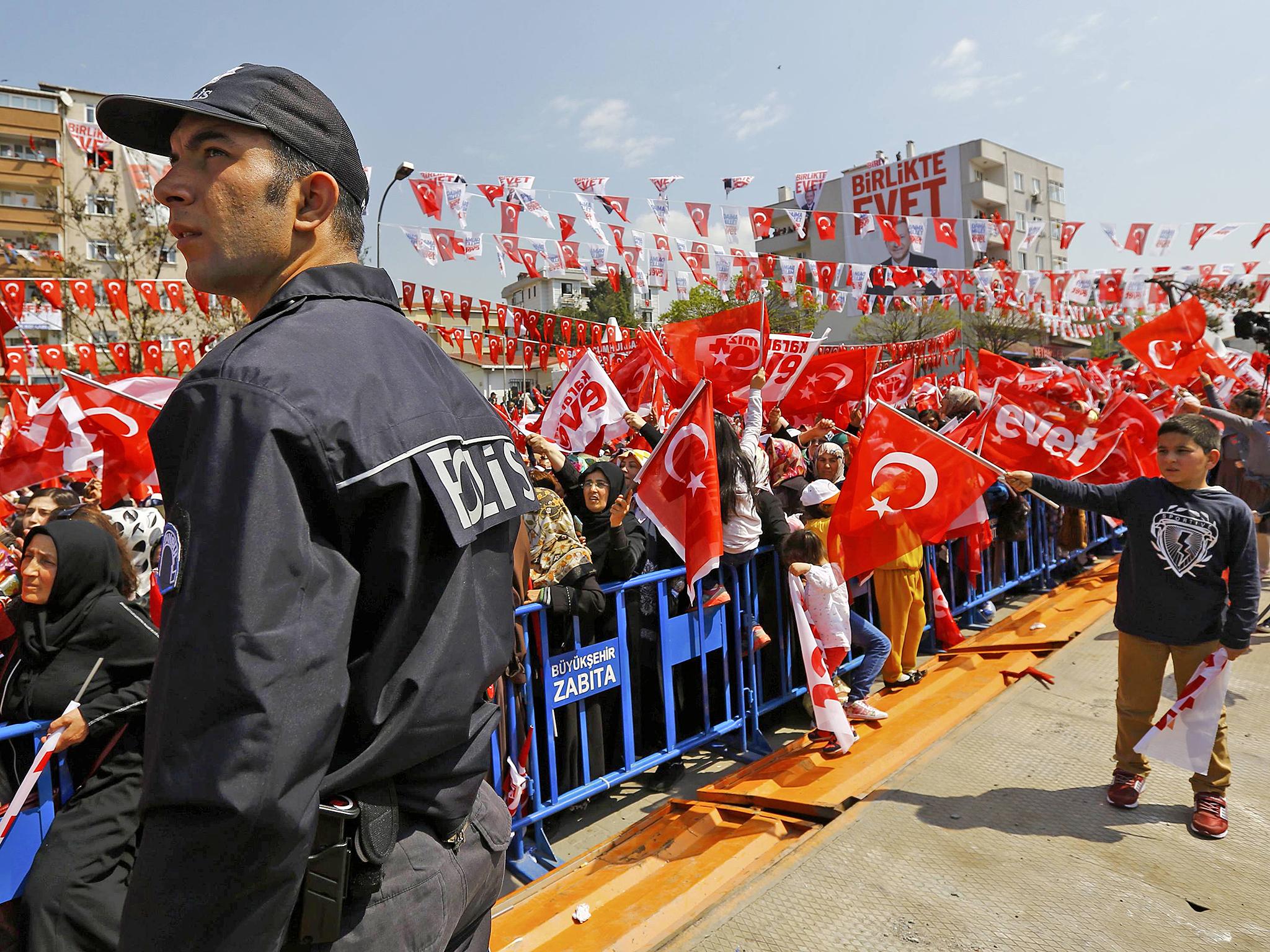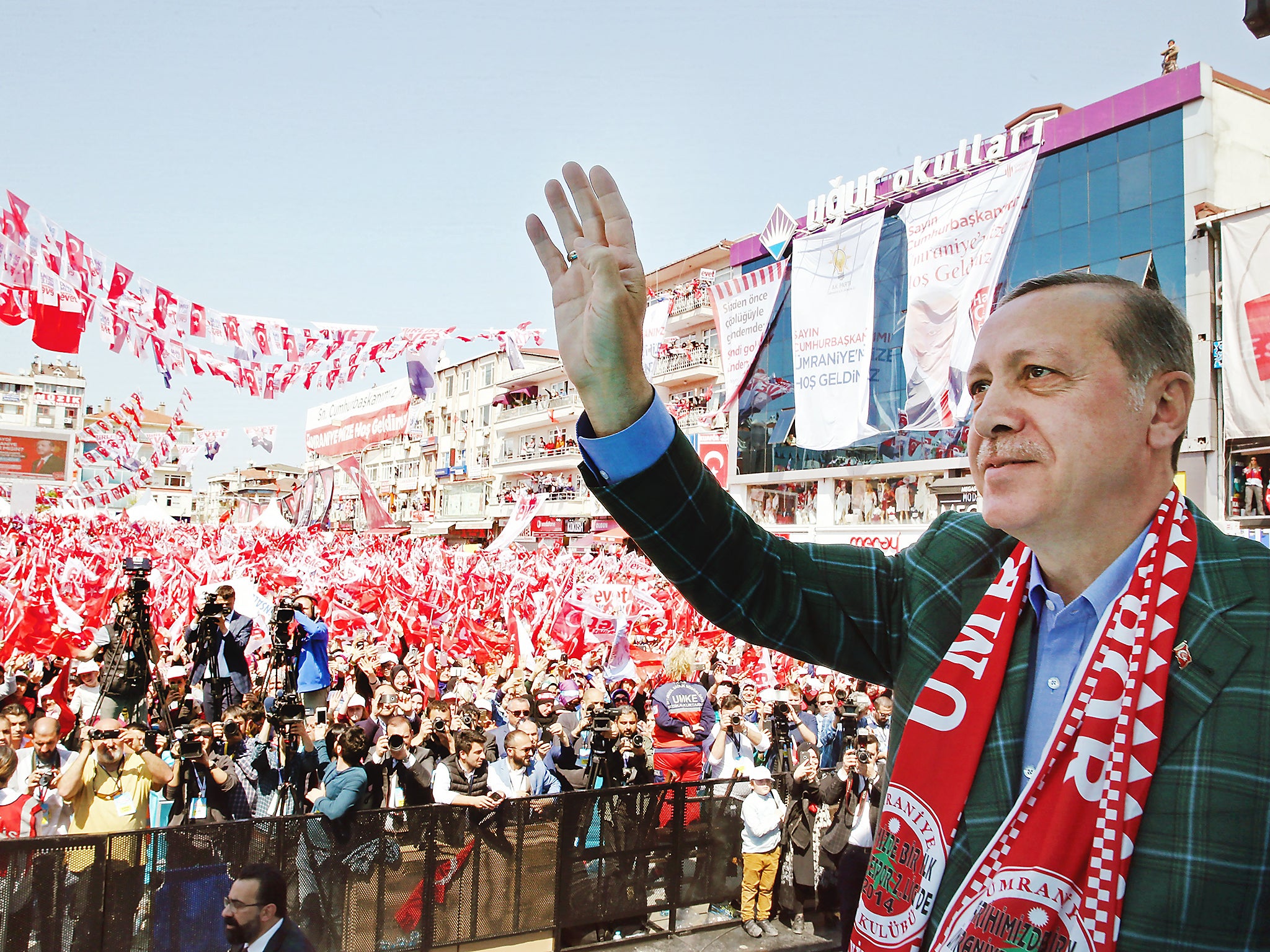Dark cloud of Turkey's recent past hangs over vote to change country's future and give President Erdogan more power
‘It does not suit 80 million to be governed by one man’s thinking,’ says one supporter of the No campaign, but result is on a knife-edge


Belgin Aksoy has always been deeply interested in politics and should have been actively involved in the referendum campaign. But all her time is now devoted to working for the release of her husband, arrested in the crackdown that followed last summer’s attempted coup, facing up to 45 years in prison on charges of belonging to a terrorist organisation.
The shadow of Turkey’s recent past – turbulent, violent, divisive – the putsch blamed on the exiled cleric Fethullah Gulen (who denies all involvement), the mass detention, the war with the Kurds and the Isis bombings, casts a dark shadow on Sunday’s vote by which Recep Tayyip Erdogan wants to formalise his overwhelming grip on power.
Under the proposed changes to the constitution the office of president, currently a ceremonial one, will dominate the levers of government, abolish the post of prime minister and curtail the right of parliament to scrutinise legislation and the actions of the head of state.
“You could say that there is a new kind of politics and has become very personal for many of us,” says 31-year-old Mrs Aksoy at her home in Istanbul. “We now have to live with the effect of it every day. In my case it is going to see my husband in jail one day a week and working on other days on his case. And then we have to cope with our lives. I have to look after our three children by myself, instead of two of us doing it.”
“Of course the referendum is important and in the past I would have been going to rallies, helping with leaflets. But now I have to focus on personal problems. Of course I shall vote and I shall vote No. I think it is dangerous to change the law to give one man, especially this man, even more control than he has already.”
Belgin’s husband Demir used to work as a civil servant before being accused of being a Gulenist “sleeper” and detained last October when police smashed into their apartment at night. He has not been disenfranchised: a ballot box will be provided for him and other inmates. The judge who was investigating him will have the same opportunity at another prison – he was arrested for allegedly being a Gulenist in December. Around 120,000 were held after the attempted coup of whom more than 60,000 remain in custody. The government announced that 175 new prisons needed to be built this year.
Zeynep Marangoz, a neighbour of the Aksoys in the Emirgan district, has been involved in the No campaign from the start. It has been tough going. “Everything has been done to favour the other side," says the 23-year-old student. “All the publicity, the TV programmes, the newspapers have to support the President. We are finding it very difficult to get access and even getting things like halls to rent for our rallies. So I think that we are doing quite well under the circumstances. We think a lot of people are nervous about telling opinion polls that they will be voting No.”
The latest opinion polls point toward a Yes victory. One, by the Konda company, indicates the turnout is expected be nearly 90 per cent, of which 51.5 per cent voting Yes and 48.5 per cent No. Another, by Gezici, gives Yes 51.3 per cent and No 48.7 per cent. But, after misleading results in a number of recent polls internationally – from Brexit to Donald Trump’s victory – both pollsters point out margins of error should be taken into consideration before reaching conclusions on the result.

There have been repeated complaints from opponents of President Erdogan about imbalance in media coverage. After the referendum was called, his ruling Justice and Development Party (AKP) issued a decree suspending the normal rules during the election that candidates must be given equal airtime. An example of what followed was the experience of the general chairman of the opposition CHP party, Kemal Kilicdaroglu, who had his interview with the state-funded TRT television delayed while the channel carried live coverage of an Erdogan rally.
The difference in the levels of publicity is also glaringly reflected in the streets of cities like Istanbul and Ankara, where huge posters of Mr Erdogan and, to a lesser extent, Prime Minister Binali Yildirim look down from public buildings. Opposition posters, of a young girl with a rising sun in the background and the slogan “Vote No for our future”, are few and far between, and often stuck on down on pavements rather than walls.
The No campaign charges that the government is trying to undermine it by detaining its leaders. They include Sera Kadigil, of the secularist party CHP and Selahattin Demirtas and Figen Yuksekdag of the Kurdish HDP. There are also complaints of harassment. Meral Aksener, who is challenging the referendum from a nationalist stance, had one rally attacked by a mob; another, at a hotel, was disrupted when the management switched off electricity.
Despite difficulties, opposition rallies have continued to be held with the message that a victory for Mr Erdogan will further fracture the country. “It makes no sense to aggravate the polarisation of a country, he is already performing his current duties without recognising the law," says Sukru Yalcin at a march in Istanbul’s Eminonu Square. “We are saying that it does not suit 80 million to be governed by one man’s thinking.”

The ruling party and the Yes campaign, unsurprisingly, reject the claims, and point towards a “foreign hand”, a familiar spectre raised in response to criticism. Focusing on objections made in Germany, Mr Erdogan declared at public meeting in Reze, the heartland of his support: “We will defy the grandchildren of Nazis. A few fascists will never destroy Turkey’s honour.” Mr Yildarim warned: “We do not want interference in our vote, they should not interfere in our democratic process. Outsiders should mind their own business. Europe should mind its own business.”
The Yes campaign had put great stress on the theme of Turkey standing up to Western powers, and the polls found this has had resonance among voters, including some who were not previously Erdogan supporters. Selim Abdulhamid, a 43-year-old building contractor from Anatolia, says: “My family comes from a conservative area, but I did not care much for Erdogan and the AKP in the past.
“But then I saw that many in Europe and America supported the coup. The man who planned it, Gulen, is safe in America. I began to realise that all this Western talk of democracy is a sham. So Turkey needs someone who is strong and stands up for us. And he needs to deal with those of the Kurdish who are terrorists and Daesh [Isis] as well. We need a strong leader.”
Metin Kaya, who lives in the same Istanbul district where Mr Erdogan was born, has no doubt: “He has a lion heart; we know he will defend Turkey as no one has done before him. Europe is afraid of us since the Ottoman Empire and that past, which makes us proud, is repeated today. We need to have a new relationship with the West.”
That relationship will range across issues from what the Erdogan government does next in Syria; what it will do with the tens of thousands of refugees who had used the country as a gateway to Europe as well as to the rule of law and civil rights within the country.
Turkey’s referendum will have a widespread effect a long way past its borders.
Join our commenting forum
Join thought-provoking conversations, follow other Independent readers and see their replies
Comments
Bookmark popover
Removed from bookmarks